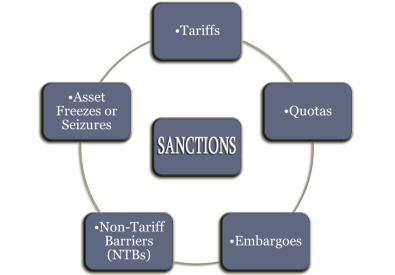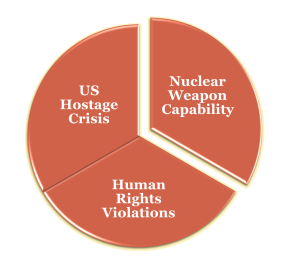Sanctions impact
Sanction is an intimidating tool in the hands of economically powerful country that could completely cripple the import and export operations of preyed countries, causing a substantial decline in the economy depending on how much it relies on imports/exports operations. Sanctions oppose the very fundamental spirit of targeted businesses, which is to expand and to move into new areas of opportunities in search for profits. Trade restrictions are capable of decimating companies and were the reason behind nearly bankrupting many companies. Perhaps the greatest illustration is how 2015 EU sanction impacted the joint venture project between Exxon Mobil Corporation and Russia’s Rosneft Oil Company that could result in $1billion in lost revenues. Sanctions are capable of decapitating companies because they impact opportunities, profits, relationships and resources availability.
On the other hand, sanctions could act as a door opener and a great opportunity for other countries. By sealing trade doors with a specific country, or in some cases continents, it automatically opens up other doors for other countries to enter the market and seize new opportunities. The greatest example is the exclusivity agreement between China and Iran in 2011, which gave Chinese companies exclusive rights to several oil and natural gas fields in Iran.
Another example, when OPEC (Organization of Petroleum Exporting Countries) along with Egypt, Syria and Tunisia declared an oil embargo on USA in October 1973, Japanese automakers ceased the opportunity and began to make compact and fuel-efficient cars for the U.S. market, resulting in a permanent and significant reduction in oil usage.
Forms of Sanctions.
A sanction can be enforced in several ways. These ways include:
- Tariffs – Taxes imposed on goods imported from a specific country.
- Quotas – A limit put on the quantity of goods that can be either imported from another country or exported to that country.
- Embargoes – A trade restriction that prevents a country from trading with another. A government can prevent its citizens or businesses from providing goods or services to another country. Strategic Embargo restricts military goods trade, while a Trade Embargo will restrict anyone from trading with a specific country regardless of the product type.
- Non-Tariff Barriers (NTBs) – Non-Tariff restrictions on imported goods that can include increase in licensing complications and packaging requirements, product quality and additional requirements that are not specifically a tax.
- Asset Freezes or Seizures – Preventing assets owned by a country or individuals from being sold or moved, e.g. Iran $100 billion frozen assets in foreign banks.
Types of sanctions.
Unlike the forms of sanctions there only two types of sanctions. The first type is “Unilateral” sanction, which means that a single country is enforcing the sanction, e.g. US unilateral sanction against Iran in regards to the famous hostage situation in 1997-1981 following the revolution. While a “Bilateral” sanction means that a group or block of countries is supporting the sanction, e.g. UN Sanction on Iran regarding its nuclear development program which banned the purchase of Iran oil in European market.
Important dates in Iran Sanctions.
Iran.
After years of sanctions and embargoes, P5+1 (Composed of the five permanent members of UN Security Council: U.S., China, Russia, France and the United Kingdom (P5) and Germany (+1) have finally come to an agreement with Iran that would allow monitoring of current Iran nuclear operations. The deal will require Iran to lower Uranium enrichment purity, decrease the number of active centrifuges cells nationwide to 6,000 instead of 19,000, and limit the uranium stockpiles it can keep, in exchange of lift of international sanctions that have hampered the Iranian economy for a number of years. The deal will also enforce Arak heavy-water facility downgrade in order to produce non-weapons grade plutonium and will require Fordow facility to be converted into a research center. The Iran nuclear program has been a very controversial point of contention between Iran and the rest of the world, but recent negotiations aim to end the conundrum.
Impact of sanction lift.
- Impact on Oil Supply & Demand.
- Impact on transportation.
- Impact on equity & world trade.
- Impact on Iranian Resources.
Oil Sector.
Perhaps the most significant impact will be felt by the Oil industry, if US Congress approves the deal, Iranian oil will be widely available for the first time in decades. When Iranian oil begins to flood the market, it will eventually influence the world oil supply and therefore oil prices. Noteworthy, it will take years to improve worn out Iranian drilling equipment’s to produce enough oil to make a noticeable impact. The world oil supply may increase if the pending Iranian nuclear program deal is approved, but Iran was accounted for only 4.1% of the world supply of oil in 2004, and when compared to Russia current production level at 11.70% and USA 13.67% Iran oil exports level is clearly not enough to significantly shift the world oil supply or alter its price, at least not for a few more years. Iran has been under trade sanctions for years, due to United Nations embargo on Iranian oil in 2005. In addition, other sanctions by USA and EU caused Iran oil production infrastructure to deteriorate and was not maintained for years due to limited funds and embargoes on required equipment’s.
Points to consider, a recent CNN poll discovered that majority of US citizens demanded that the congress refuse the Iran Nuclear deal. And on a related note, Israeli leader, Netanyahu, shares the same opinion based on Iran’s past history of nuclear bomb capability.
Current Iran oil production level is 3.35million barrels/month, equal to 3.54% of world supply, just enough to meet the country’s current demand, and even when combined with current Iran oil reserve, estimated at 25 million barrels of oil, it will not drive a great decrease in oil prices. Experts such as Richard Nephew, a former U.S. Department of State Official specializing in the sanctions regime, estimates that it will take around a year to add approximately 500,000 barrels to current production levels and will take decades to go back to same pre-sanctions levels. On the same note, Wood Mackenzie, an oil consultancy, expect an increase of 600,000 by the end of 2017. Despite the momentarily decrease of oil prices as a result of oil sanctions negotiations announcement, we now know that Iran is simply not capable to flood the market with oil. Bijan Namdar Zanganeh, Iran Petroleum Minister, stated that he’d like Iran to go back to same pre-sanctions levels when it was accounted for supplying over 40% of Europe imports. On the same note, he added that Iran is ready to boost oil production only a week after the sanction is lifted.
Equity & World Trade.
Banning Iranian banks from using the SWIFT global payment system crippled Iran economy that depends mostly on oil export income. Though sanctions against Iranian Oil prohibited its sales in European and American markets, Iran, however, was able to find buyers for its Oil, nevertheless was unable to access funds because these payments were frozen in offshore accounts, this move led to the pile up of approximately $100 billion in frozen assets. These embargoes and sanctions lasted for years, and piled up mounds of lost revenues and profits for businesses. According to history books, Germany and United States were Iran’s largest trading partners around 35years ago. However after the 1979 revolution, the tables were turned when United States, UN and EU imposed an embargo against Iran that changed the trading landscape.
Should Iran comply with P5+1 intensive nuclear inspections and restrictions deal, most of financial sanctions will be lifted and Iran will regain access to frozen assets, this will lead to increased streams of revenue and greater freedom in financial dealings, but that’s not all. After sanctions related to Iran’s nuclear program are lifted, a number of global industries should benefit from the opening up of the second largest market in the Middle East. Given that Iran is home to the fourth largest proven crude oil reserves and second largest natural gas reserves, lifted sanctions represent a huge opportunity for global energy companies such as Royal Dutch Shell (RDS.A) and Total SA (TOT) and should see increasing business opportunities. Although, US businesses and ordinary citizens will not greatly benefit by the lift and will remain unable to trade with Iran without specific authorization according to a statement by a senior Obama administration official, nevertheless, there are a few exceptions, and the major one will be civil aviation.
Unlike the oil industry, lifting Iran financial sanctions and re-allowing it to use Swift system is expected to impact imports and exports operations and in turn affect the economic ecosystem at every level.
Worth mentioning, Iran economy plunged into depression due to politics not economic failures, and should be able to re-establish its previous strong position once sanctions are lifted.
Transportation (Land & Air)
According to Iran’s transportation minister recent statement, the country will press to replace at least 400 commercial airplanes within the next few years once the EU sanction is lifted. And since civil aviation is on the US sanction exception list the American airplane manufacturer, Boeing Co. (BA), should see an increase in revenues to meet the new Iranian demands. Boeing will not be the only transportation company that will benefit from the lift, Peugeot, the French car manufacturer, along with Volkswagen should also witness an increase in demand and production as a result of new market demands. Peugeot ceased operations in Iran in 2012 but will return to serve Iran market when/if EU sanctions are lifted.
Iranian Resources.
If all conditions included in the Joint Comprehensive Plan of Action (JCPOA) are met the trade sanctions will be lifted, presenting a great opportunity to conduct new trade deals between the Iranian market embodied by its resources that were placed on house-arrest for decades, and the European and American consumer markets. According to experts and market researchers, Iran’s equity market managed to return an impressive compounded annual of 18% while isolated from the rest of the world by sanctions, clearly an indication of financial prospect prosperity especially after economic sanctions are lifted.
References.
- The British Broadcasting Corporation (BBC): bbc.com
- S. Department of the Treasury: www.treasury.gov/resource-center/sanctions/Programs/Documents/iran.pdf
- International Atomic Energy Agency: iaea.org/publications/documents/treaties/npt
- iaea.org/publications/documents/infcircs/treaty-non-proliferation-nuclear-weapons
- Council on Foreign Relations: cfr.org/iran/international-sanctions-iran/p20258
- Bloomberg L.P: bloomberg.com/news/articles/2015-08-02/iran-s-oil-minister-says-output-to-rise-one-week-after-sanctions
- Cable News Network (CNN): cnn.com/2015/07/28/politics/obama-approval-iran-economy
- Investopedia: investopedia.com/financial-edge/0112/possible-effects-of-an-iran-embargo.aspx
- S Department of State Office of the Historian: history.state.gov/milestones/1969-1976/oil-embargo
- Wisconsin Project on Nuclear Arms Control: wisconsinproject.org/countries/iran/nuke-miles.htm
- CNN Money: cnn.com/interactive/news/economy/worlds-biggest-oil-producers/
